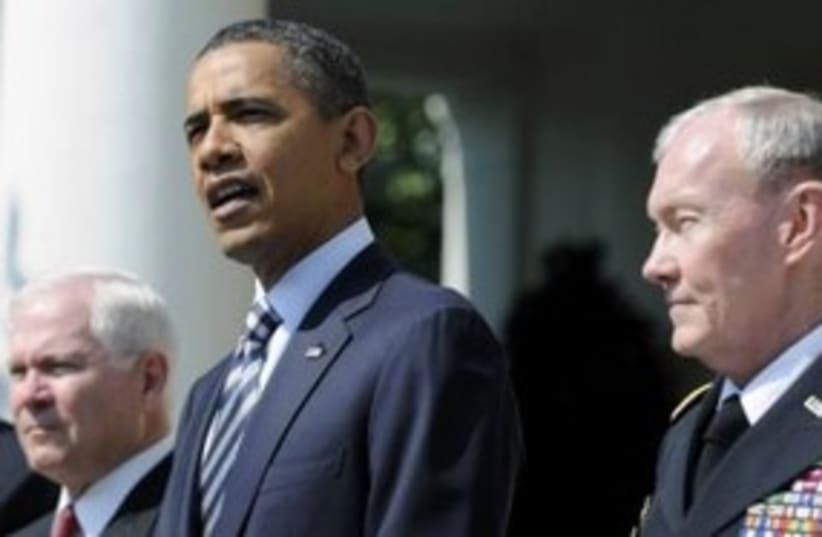If your image of President Barack Obama could use some lowering, former US defense secretary Robert Gates has what you’re looking for. The excerpts publicized this week from his new book, Duty: Memoirs of a Secretary of War, provide a revealing look into the workings of the Obama administration.And it isn’t pretty.The book paints a significantly more negative portrait of Barack Obama (and Hillary Clinton) than one would expect from Gates’s team-oriented statements while in office. It raises some serious questions about what drives the Obama administration’s foreign policy – and what drives Barack Obama.
Gates is a veteran of five administrations, including those of Obama and both Bushes.His criticisms and observations are not easily dismissed.Regarding Clinton, Gates has praise for her work ethic and, of all things, her sense of humor. I guess you had to be there. But Gates reveals how shocked he was at admissions made in his presence by both Clinton and Obama. Both conceded that their opposition as Senators and presidential candidates to the successful Bush “surge” in the Iraq war was motivated by politics, and not ideology.Obama had staked out a vocal anti-surge position in preparation for his run for the presidency from the left wing of his party.Gates writes that “Hillary told the president that her opposition to the [2007] surge in Iraq had been political because she was facing him in the Iowa primary.”That cynicism seemed to anger Gates, very much a patriot who put country above politics and worked for both Democratic and Republican administrations.Obama’s cynicism didn’t end there. He had campaigned against the Iraq war, asserting that president Bush had “taken his eye off the ball” by neglecting the allegedly more important Afghan war in order to invade Iraq. Yet, Gates’s administration experience led him to conclude that Obama’s pro-Afghan war position was also politically calculated.As Gates listened to Obama even immediately after he had ordered a surge of troops into Afghanistan, “I thought: The president doesn’t trust his commander, can’t stand [Hamid] Karzai, doesn’t believe in his own strategy and doesn’t consider the war to be his. For him, it’s all about getting out.”Interestingly, Gates had the opposite reaction to president George W. Bush. Gates describes Bush as a “mature leader” who on the Iraq surge “risked reputation, public esteem, credibility, political ruin and the judgment of history on a single decision he believed was the right thing for the country.”Gates expresses concern about Obama’s “absence of passion” on all matters dealing with military strategy – except when the “Don’t Ask, Don’t Tell” policy giving gays more freedom to serve was raised.Also of note is that Gates found “agreements with the Obama White House good for only as long as they were politically convenient.”This is all worrisome for America’s allies, especially those who are, like Israel, Saudi Arabia, Japan and Taiwan, particularly reliant on American commitments of support.How does an ally tell the difference between a presidential commitment and political lip service? What promises and agreements is Obama willing to enforce? For which alliances will he go the mat, and for which will he only go through the motions? Which of his policies are based on principle, and which are poses? Is an ephemeral chemical weapon “red line” in Syria fundamentally different from a commitment to keep Iran from possessing a nuclear weapon? Is a half-hearted Afghan surge inspired only by political expedience so different from an equally politically expedient promise to “have Israel’s back”? This leads to a more deeply perplexing issue. Amazingly, as the president begins his sixth year in office, we still have the nagging sense that we don’t really know just who he is. For a man with two autobiographies to his name and five presidential years behind him, he has revealed shockingly little about his background or core belief system – if he even has one. The president of the self-declared “most transparent administration in history” is arguably the most opaque chief executive in memory.President Obama seems to be estranged from his own foreign and military policy. It’s anyone’s guess whether there are any core principles guiding him – other than American retreat.Underneath it all, is there some comprehensive Obama Doctrine in play? If so, what are its tenets? Or, as appears to be the case, is he operating on whims and making it up as he goes along? Are his actions inspired more by cosmetics or by convictions? Most media remain frustratingly incurious about such matters.More than in any other realm, the essence of a modern president is reflected in foreign policy. American foreign policy should project strength, resolve and predictability. Sadly, as Robert Gates confirms, President Obama reflects none of these.The writer is an American attorney and political commentator living in Israel. He serves as counsel to Republicans Abroad Israel.Cynicism as foreign policy: Obama’s defense secretary speaks
American foreign policy should project strength, resolve and predictability. Sadly, as Robert Gates confirms, President Obama reflects none of these.
